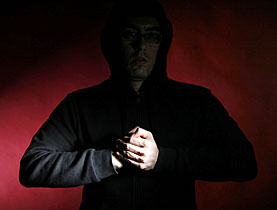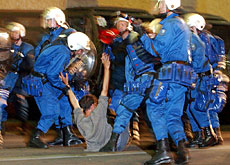Online “wanted” photos trigger mixed feelings

This week Zurich city police published on the internet photos of unidentified men suspected of committing crimes during the May 1 celebrations.
The move has been widely welcomed, but
Zurich lawyer Markus Bischoff tells swissinfo.ch why he is concerned about people being pilloried online before they have been convicted of anything.
Bischoff sits in Zurich cantonal parliament as a member of the leftwing “Alternative List” party.
swissinfo.ch: The police’s latest method of hunting criminals is clearly successful – several suspects have already been identified. Yet you still have reservations. Why?
Markus Bischoff: Success still doesn’t justify the means. You’ve got to take into account that it’s not clear whether these people are guilty or not. The police claim they are guilty.
Putting these people’s faces online has a considerable pillory effect. What’s more, we know that once someone’s photo is on the internet, it stays on the internet – even if the police take it down.
There must be evidence of a serious crime and it must be of enormous public interest. If a prisoner who has already committed various crimes escapes from prison, the risk is obviously high and people have to react more quickly. Police are certainly justified in releasing a photo, if there’s no other way of getting a result.
It bothers me too when people ruin the May Day celebrations, but that isn’t serious enough to warrant an online manhunt. If you start going down that route, in five years we’ll be putting mug shots of shoplifters online.
swissinfo.ch: Isn’t that a fantastical vision of the future?
M.B.: When I was in the United States, I was reading a small-town newspaper and it told me who was in prison for what crime, who had been busted for speeding etc. Such a state of affairs could also become the norm here.
That can’t be in people’s interests. Every person has the right to make a mistake. And then they might have to pay the penalty. But to then also put these people in the pillory – that stays public for a very long time. That is devastating and in my opinion doesn’t serve a sense of justice.
swissinfo.ch: Zurich city police justify themselves by pointing to the new code of criminal procedure.
M.B.: The code of criminal procedure has also attracted criticism. People say it’s a disproportionate interference that needs to be rethought. But throwing stones or damaging property – I personally don’t think offences like that belong in there, although they need to be punished.
swissinfo.ch: In 2009 three young men beat up two others at Kreuzlingen station. Police put the video online. Was that justified?
M.B.: That was published because it was a crime against life and limb. But even there the police should try to solve the case via other means.
swissinfo.ch: In 2009 Defence Minister Ueli Maurer said trouble-makers should lose their anonymity. One reason he gave was that employers shouldn’t be expected to have to work with people who at the weekend rip up a stadium and then turn up on Monday in a tie and suit.
M.B.: That’s a nice sound bite, but we know that criminals have various faces. They can even reintegrate into society, but without criminal proceedings. There’s something very pubescent about taking part in brawls or May 1 violence. Many people, especially young adults, go through limit-testing experiences like this. And it’s also important that not everything is published online immediately.
swissinfo.ch: But you can understand people who say it can’t be right that shoplifters, thugs, boy racers, football hooligans and so on simply break the law for fun while victims and tax payers pick up the bill?
M.B.: If you commit a crime, you should be punished. That’s right and proper. But that doesn’t mean that someone who appears on the internet is actually guilty. There has to be the presumption of innocence.
swissinfo.ch: The Zurich data protection officer Marcel Studer doesn’t have a problem with publishing the May 1 photos. Neither do Daniel Jositsch nor Martin Killias, both criminal lawyers. Why are you so sceptical?
M.B.: [Jositsch and Killias] are both candidates [in October’s federal elections] and in that situation you have to be as popular as possible.
But here you really have to discuss proportionality, because you’re dealing with relatively minor offences and a relatively major intrusion into someone’s personal rights. Such issues are always tested on offenders, who are unpopular. Indeed, those who rioted on May 1 are extremely unpopular. And against people like that a broad consensus always forms quickly.
A constitutional state must be careful that it doesn’t overstep boundaries. It’s time that a debate is launched about this, that people look carefully at the legal provisions because there are various interpretations as to how they should be construed. In my opinion we should maintain the relatively restrictive practice that we’ve had until now.
What’s more, punishments currently handed down by the courts are higher than some time ago. Today people would like to solve all society’s problems using criminal law. We are using the widening of the law as an educational tool for the population. And that I find worrying.
The federal government, cantons and communes want to act together against youth violence.
Two national programmes are being implemented by the Federal Social Security Office for 2011–2015. The federal government is spending upwards of SFr8.65 million ($8.2 million) on the programmes.
The “Nationwide youth and violence prevention programme” aims to reduce the number of violent acts among young people. To reach children as early as possible, the programme starts with families and includes schools and places where older children and adolescents meet, such as parks and sports fields.
The “Youth media protection and media skills” programme aims to protect young people better from dangers inherent in films, games, mobile phones and the internet.
The federal government will coordinate and cooperate with cantons, communes and the industry.
(Translated from German by Thomas Stephens)

In compliance with the JTI standards
More: SWI swissinfo.ch certified by the Journalism Trust Initiative












You can find an overview of ongoing debates with our journalists here . Please join us!
If you want to start a conversation about a topic raised in this article or want to report factual errors, email us at english@swissinfo.ch.